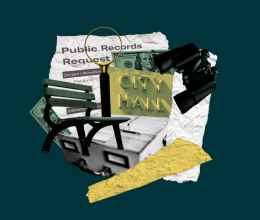March 10-17, 2013 marks Sunshine Week, a yearly initiative that seeks to educate the public about open government. Unfortunately, this year marks perhaps one of the gloomiest forecasts in recent memory for Ohioans’ right to know. Over the past few days, many of Ohio’s top officials have clashed sharply over whether the state’s new public-private partnership for economic development, named JobsOhio, would be subject to a state audit. Disagreements over whether the agency may be audited underscore the overall need for more transparency and the almost total secrecy surrounding the use of public dollars.
David Yost, the first-term Republican state auditor, believes he has authority to audit JobsOhio’s financial records because a significant portion of their funding is taxpayer dollars or leveraged by public resources. However, Governor John Kasich and leaders in the Ohio General Assembly have gone on record to contend Auditor Yost may only inspect public funds JobsOhio has received, but not any private contributions. Governor Kasich and the legislature have even publicly hinted that they will pass legislation specifically preventing Auditor Yost from performing a full audit of JobsOhio.
While this recent turn of events may be fascinating political theater, there is a great deal at stake with JobsOhio’s fate. granted to the public-private partnership. JobsOhio was created legislatively by the General Assembly, replaced the state’s Department of Development, its board was appointed by the Governor, received state funds for its start up, and continues to receive revenues from state liquor sales.
Despite obvious entanglement with the state government, leaders have maintained that JobsOhio is a private entity that is largely exempt from the state’s public records laws. By hiding behind a purportedly private organization, the Governor and other leaders have effectively cut off public access to records that would have been available if JobsOhio did not replace the state Department of Development. Ohioans should not allow leaders to play a shell game with the public’s right to know.
The ability for Auditor Yost to inspect JobsOhio’s financial records has now become the last stopgap between the public’s right to know, and government operating in the shadows. Currently, JobsOhio only offers a single privately-created annual financial report that provides little information about what money it receives and how it spends its resources. The public and the press are largely shut out and unable to obtain information about its operations. In the days preceding Auditor Yost’s subpoenas, news broke that JobsOhio had been given an additional $5.3 million in state grants, yet when questioned, legislative leaders seemed unaware this had occurred several months prior.
Such large amounts of public money transferred without detection shows just how closed JobsOhio’s operations are to the people of Ohio—and illustrates why officials should ensure that all public-private partnerships should be fully subject to state public records laws. Government is quickly moving towards increased privatization in a variety of spheres, whether it be charter schools, private prisons, public transportation, or economic development. If state officials bar the windows and keep the public in the dark regarding JobsOhio, what will prevent them from doing so with other quasi-private entities performing government functions?
These concerns are not idle worries—Ohio is a state that has been marred by political scandals in the past and taxpayers with long memories are right to be suspicious. Not only should Auditor Yost fully inspect JobsOhio’s finances, but the state legislature must reconsider the broad transparency exceptions it has carved out for JobsOhio. While JobsOhio may be doing everything right, history shows that secrecy and corruption often travel side by side. If officials truly have nothing to hide, then they should open their books and allow the people to see. We are a government of the people and by the people, but government should also be open and accountable to the people.





